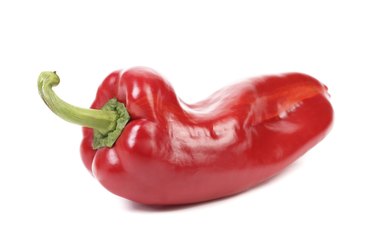
Cayenne pepper has been used for medicinal purposes for about 9,000 years. While cayenne pepper as a whole food is safe to eat during pregnancy, you may not want to take it as a supplement. Talk to your obstetrician about cayenne pepper and any other alternative forms of medicine you may be taking during your pregnancy.
Uses for Cayenne Pepper
Video of the Day
Cayenne pepper is a spice that's used in cuisines throughout the world, including Italian, Chinese and Mexican. Capsaicin is the substance in the spice that not only provides its distinct heat but also the pepper's medicinal benefits. As a supplement, capsaicin is said to have pain-relieving powers and is used both topically and orally. It's used to help manage pain caused by arthritis, surgery and nerve damage. It may help relieve low back pain as well.
Video of the Day
Cayenne Pepper and Pregnancy
The American Pregnancy Association advises that cayenne may be used topically when you're pregnant. It's not recommended as an oral supplement during pregnancy, reports the University of Maryland Medical Center, but you may be able to eat cayenne pepper during meals. If you have issues with pregnancy-related heartburn, however, you may not tolerate the spicy pepper when it's added to the food you eat.
Tips for Adding to Diet
To get some of the benefits of the capsaicin during your pregnancy, use fresh or dried pepper in some of your food. You can slice the fresh pepper and add it to stews, chili or stir-fries. Or sprinkle dried flakes or powder into your pasta sauce or soup for a little kick. Use vinegar to wash your hands after handling the pepper, advises the medical center. Soap and water is ineffective at getting the spicy oil off your hands, and you don't want to cause irritation, especially to your eyes.
Other Considerations
In addition to the concerns about heartburn, if you're allergic to latex, bananas, avocados or kiwi, you may also be allergic to cayenne and should avoid it. In addition, if you plan on nursing your baby, you need to omit cayenne from your diet altogether when you're breast-feeding, as both food and as a supplement, because the capsaicin passes to the baby through your breast milk, and this may cause irritability in the infant.